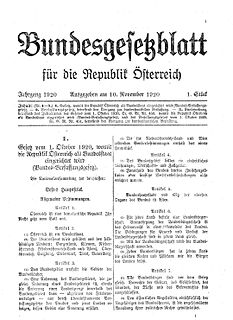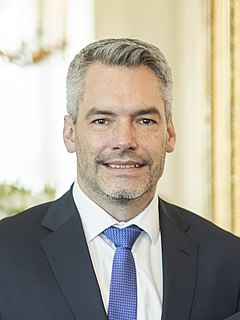Separation of powers refers to the division of a state's government into branches, each with separate, independent powers and responsibilities, so that the powers of one branch are not in conflict with those of the other branches. The typical division is into three branches: a legislature, an executive, and a judiciary, which is the trias politica model. It can be contrasted with the fusion of powers in parliamentary and semi-presidential systems, where the executive and legislative branches overlap.

The Federal Chancellor of the Republic of Austria is the head of government of the Republic of Austria. The position corresponds to that of Prime Minister in several other parliamentary democracies.

The government of Ethiopia is the federal government of Ethiopia. It's structured in a framework of a federal parliamentary republic, whereby the prime minister is the head of government. Executive power is exercised by the government. The prime minister is chosen by the lower chamber of the Federal Parliamentary Assembly. Federal legislative power is vested in both the government and the two chambers of parliament. The Judiciary is more or less independent of the executive and the legislature. They are governed under the 1995 Constitution of Ethiopia. There is a bicameral parliament made of the 108-seat House of Federation and the 547-seat House of Peoples' Representatives. The House of Federation has members chosen by the regional councils to serve five-year terms. The House of Peoples' Representatives is elected by direct election, who in turn elect the president for a six-year term.
Chancellor is a title of various official positions in the governments of many nations. The original chancellors were the cancellarii of Roman courts of justice—ushers, who sat at the cancelli or lattice work screens of a basilica or law court, which separated the judge and counsel from the audience. A chancellor's office is called a chancellery or chancery. The word is now used in the titles of many various officers in various settings. Nowadays the term is most often used to describe:
A government or state agency, sometimes an appointed commission, is a permanent or semi-permanent organization in the machinery of government that is responsible for the oversight and administration of specific functions, such as an administration. There is a notable variety of agency types. Although usage differs, a government agency is normally distinct both from a department or ministry, and other types of public body established by government. The functions of an agency are normally executive in character since different types of organizations are most often constituted in an advisory role—this distinction is often blurred in practice however, it is not allowed.
Ministry or department, also less commonly used secretariat, office, or directorate are designations used by a first-level executive bodies in the machinery of governments that manage a specific sector of public administration.

The Australian Government, also known as the Commonwealth Government, is the national government of Australia, a federal parliamentary constitutional monarchy. Like other Westminster-style systems of government, the Australian Government is made up of three branches: the executive, the legislative, and the judicial.

In Austria, the Ministry of the Interior is a federal government agency serving as the interior ministry of the Austrian government. It is chiefly responsible for the public security, but also deals with matters relating to citizenship, elections, referendums, plebiscites and the alternative civilian service. The Ministry of the Interior is considered one of the most important ministries in Austria

The Government of Ontario, formally Her Majesty's Government of Ontario, is the body responsible for the administration of the Canadian province of Ontario. A constitutional monarchy, the Crown—represented in the province by the lieutenant governor—is the corporation sole, assuming distinct roles: the executive, as the Crown-in-Council; the legislature, as the Crown-in-Parliament; and the courts, as the Crown-on-the-Bench. The functions of the government are exercised on behalf of three institutions—the Executive Council; the Provincial Parliament ; and the judiciary, respectively. Its powers and structure are partly set out in the Constitution Act, 1867.

The Cabinet of Brazil is composed of the Ministers of State and senior advisors of the executive branch of the federal government of Brazil. Cabinet officers are appointed and dismissed by the President. There are currently twenty-three Ministries, including six Ministry-level offices: the Chief of Staff, Secretary of Government, General-Secretary of the Presidency, Institutional Security, Attorney General, and President of the Central Bank.

The Government of Austria is the executive cabinet of the Republic of Austria. It is composed of the Chancellor, who is head of government, the Vice-Chancellor, and the ministers.

The Cabinet of Nigeria is part of the Executive Branch of the Government of Nigeria. The Cabinet's role, as written in the Ministers' Statutory Powers and Duties Act is to serve as an advisory body to the President of Nigeria. Members of the Cabinet are appointed and report to the President, who can dismiss them at will. The Cabinet currently oversees 24 Federal Ministries, each responsible for some aspect of providing government services, as well as a number of parastatals.
The government of Russia exercises executive power in the Russian Federation. The members of the government are the prime minister, the deputy prime ministers, and the federal ministers. It has its legal basis in the Constitution of the Russian Federation and the federal constitutional law "On the Government of the Russian Federation". The Apparatus of the Government of Russia is a governmental body which administrates the activities of the government.

The Federal Ministry for European and International Affairs or commonly just referred to as Ministry of Foreign Affairs, is Austria's foreign ministry. As a department of the Austrian Federal Government, it is responsible for the country's foreign policy, its diplomatic missions and relations to international organisations, especially the European Union.

Foreign relations between Austria and Georgia. Both countries established diplomatic relations in 1992 and Georgia opened its embassy in Vienna in 1996. Austria is represented in Georgia through a non resident ambassador based in Vienna, and through an honorary consulate in Tbilisi. Georgia has an embassy in Vienna and an honorary consulate in Graz.

The chancellor of Germany, officially the federal chancellor of the Federal Republic of Germany, is the head of the federal government of Germany and the commander in chief of the German Armed Forces during wartime. The chancellor is the chief executive of the Federal Cabinet and heads the executive branch. The chancellor is elected by the Bundestag on the proposal of the federal president and without debate.

In Austrian politics, the Chancellery is the ministry led by the chancellor. Since the establishment of the First Austrian Republic in 1918, the Chancellery building has served as the venue for the sessions of the Austrian cabinet. It is located on the Ballhausplatz in the centre of Vienna, vis-à-vis the Hofburg Imperial Palace. Like Downing Street, Quai d'Orsay or – formerly – Wilhelmstrasse, the address has become a synecdoche for governmental power.

The Federal Constitutional Law is the centerpiece of the Austrian Constitution; it comprises the Constitution's most important legal provisions. The Law defines Austria to be a democratic parliamentary republic with free multi-party elections and universal suffrage. It characterizes Austria as a federation consisting of nine federal states, but vests the supposed states that it creates with comparatively little autonomy.

Gernot Blümel is an Austrian politician of the Austrian People's Party (ÖVP). He served as Austria's finance minister from 2020 to 2021, having announced his resignation shortly after Alexander Schallenberg's resignation on December 2, 2021. Since 2015, he has been the chairman of the Vienna branch of the ÖVP. Prior, he was Chancellery minister for European Affairs, Art, Culture, and Media from 2017 to 2019; he was also General Secretary of the ÖVP from 2013 to 2015.

Karl Nehammer is an Austrian politician serving as Chancellor of Austria since 6 December 2021. He is a member of the Austrian People's Party (ÖVP) who served as Minister of the Interior from 2020 to 2021, General Secretary of the ÖVP from 2018 to 2020, and a member of the National Council from 2017 to 2020.





















